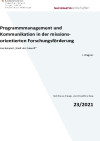Suchergebnisse
NEST international - New standards for old houses international
The main goal was to raise awareness for energetic renovations of settlement houses due to the handbook "Neue Standards für alte Häuser" in Slovakia and the Czech Republic. In doing so, the refurbishment potential has been identified in the target countries, experiences exchanged and information transferred. Contacts to the relevant target groups have been established.
BIGMODERN - Subproject 11: Dissemination of project results
The project is part of the flagship project BIGMODERN. It aims at disseminating all relevant results of BIGMODERN in a comprehensive and targeted way. It addresses different target groups, such as decision makers inside the BIG Bundesimmobiliengesellschaft, various users of federal buildings and other real estate companies nationally and internationally.
Entwurfswettbewerb für verdichtete Bauweise bei Fertighäusern
Ein Wettbewerb für die Herstellung von Fertighäusern in verdichteter Bebauung lieferte unterschiedliche Entwürfe und Vorschläge für dessen technische Realisierung. Die Ergebnisse wurden prämiert und publiziert, um die Motivation für den Markteinstieg in diesem Bereich zu erhöhen.
Programmmanagement und Kommunikation in der missionsorientierten Forschungsförderung

Diese Studie stellt sich die Frage, wie Programmmanagement und Wissenskommunikation in der missionsorientierten, angewandten Forschung konzipiert und effektiv umgesetzt werden können. Mittels Literatur- und Dokumentenanalyse, Stakeholderanalyse, internationaler Fallstudien, Interviews, Fokusgruppen sowie einem Co-Creationworkshop wurden Rückschlüsse auf die aktuelle Wirkung der Kommunikationsdimensionen des Programmes "Stadt der Zukunft" gezogen und Überlegungen hinsichtlich der Weiterentwicklungsmöglichkeiten zu Missionsorientierung nach OECD-Definition angestellt. Das resultierende Modell wurde in einem finalen Reflexionsworkshop mit dem Auftraggeber diskutiert.
Schriftenreihe
23/2021
I. Wagner
Herausgeber: BMK
Deutsch, 92 Seiten
Downloads zur Publikation
BIGMODERN - Subproject 8: Demonstration building Amtshaus Bruck - Realisation
In the frame of the flagship project BIGMODERN the "Amtshaus Bruck an der Mur" had been renovated according to above-average quality standards concerning energy efficiency and sustainability while complying with an industrial management point of view.
Innovation and Sustainability in the Construction and Housing Sector
Concepts for enhancing in-house innovation in construction; development of performance and benchmarking indicators in the housing sector. Economic proposals to improve legal and structural business environment and to increase sustainable and energy efficient construction and renovation activities.
Informationsknoten für nachwachsende Rohstoffe und ökologische Materialien

Eine Internetplattform für Baustoffe aus Nachwachsenden Rohstoffen als zentraler Informationsknoten für Architekten, Planer, öffentliche und private Bauherrn sowie Baubehörden mit dem Ziel der Verbreitung von nachhaltigem Bauen.
BioSkin - Forschungspotenziale für bionisch inspirierte energieeffiziente Fassadentechnologien
Ziel der wissenschaftlichen Grundlagenstudie war die Identifikation von Forschungspotenzialen in der Bionik für innovative Fassadentechnologien der Zukunft. Durch die Identifikation von nutzbaren Prinzipien biologischer Vorbildmodelle und Übersetzung in bionische Fassadenkonzepte werden interdisziplinäre F&E-Aktivitäten für die Entwicklung von klima-adaptiven energieeffizienten Fassadensystemen der Zukunft angeregt und Perspektiven für Innovationen eröffnet.
1000 Passivhäuser in Österreich 3. Dokumentationsperiode 2006 - 2008
3. Dokumentationsperiode des Gemeinschaftsprojektes der IG Passivhaus Österreich zur detaillierten Netzwerkdokumentation eines repräsentativen Querschnitts aller Passivhaus-Objekte in Österreich.
1000 Passivhäuser in Österreich - 2. Dokumentationsperiode 2004 - 2005

2. Dokumentationsperiode des Gemeinschaftsprojektes der IG Passivhaus Österreich im Auftrag der Programmlinie "Haus der Zukunft", einer Initiative des Bundesministeriums für Verkehr, Innovation und Technologie BMVIT zur detaillierten Netzwerkdokumentation eines repräsentativen Querschnitts aller Passivhaus-Objekte in Österreich.
1000 passive houses in Austria - 3rd documentation period 2006 - 2008
3rd documentation period of the joint project of IG Passivhaus Österreich to set up a detailed network documentation on a representative cross-section of all passive houses in Austria.
Bidirektionale Einbindung von Gebäuden mit Wärmeerzeugern in Wärmenetze
Im Projekt wurde die Möglichkeit, Wärme an beliebigen Punkten dezentral in ein Nahwärmenetz einzuspeisen, technisch und wirtschaftlich untersucht.
ThermSat - Ausbildungsprogramm "Thermischer Sanierungstechniker im Baugewerbe"
Ziel war es, ein praxisorientiertes und auf derzeitige Entwicklungen abgestimmtes Weiterbildungsangebot zu entwickeln, anzubieten, zu evaluieren und weiterzuentwickeln. Als Ergebnis wurden fundiert ausgebildete Techniker/Facharbeiter angestrebt, die im Bereich thermische Sanierung von Gebäuden sowohl praktisches als auch theoretisches Wissen aufweisen.
Passivhaussanierung im sozialen Wohnbau - Entwicklung eines Planungungstools
Entwicklung eines internetbasierten Planungstools für Passivhaussanierungen - Zielgruppe Wohnungsbaugesellschaften - Überarbeitung des tools nach Test und Evaluierung in Fallstudien. Österreich weitere Wissensverbreitung durch Fallstudien und Informationsveranstaltungen.
Plattform Energieeffiziente Krankenanstalten - Wege zu mehr Energieeffizienz
Das gegenständliche Projekt baut auf den Ergebnissen des Vorgängerprojektes "Das energieeffiziente Krankenhaus - Realistische Ansatzpunkte und Maßnahmenidentifikation" auf und zielt darauf ab, die Zusammenarbeit zwischen den Krankenanstalten in Österreich zu verstärken und eine "Plattform Energieeffiziente Krankenanstalten" zu etablieren.
Platform for Energy-Efficient Hospitals - ways to a higher energy-efficiency
The present project is based on the results of the project "The energy-efficient hospital: realistic departure points and identification of possible measures"
ThermSat - pilot training program "Thermal renovation engineer in construction industry"
The goal was to design, offer, evaluate and refine a practical training, adapted to the current development. Aim of the courses is to have well-trained engineers and technicians with practical and theoretical knowledge in the field of thermal renovation of buildings.
Passivhaus der Zukunft-Akademie - Plattform für den Wissenstransfer zwischen Bauträgern
Bauträger aus dem Wohnbau, die sich mit Niedrigst- und Passivhaus-Technologie auseinander setzen, wurden erstmals zu einem akademisch geleiteten, direkten Erfahrungsaustausch eingeladen, um sie zu kompetenten Anwendern der neuen Technologien zu machen.
IQ - focal point on information and networking in the field of energy efficient districts
Energy aspects on land use planning were worked up on the basis of research and demonstration projects in Austria, Germany and Switzerland. The target groups from administration, politics, architecture as well as developers and future dwellers were addressed with custom-made events.
MPC boxes - Model Predictive Control von aktiven Bauteilen und Messungen in zwei Test-Boxen
Es wurde eine robuste, standardisierbare, prädiktive Regelung mit Wettervorhersagedaten für thermische Bauteilaktivierung entworfen, untersucht und ökonomisch bewertet sowie mit herkömmlichen Regelungen, insbesondere für Kühlzwecke, verglichen. Simulationen und Messungen an zwei für diesen Zweck geplanten und aufgebauten Test-Boxen dienten zur Analyse von Energieeffizienz und Komfort.
